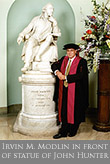Curriculum Vitae and Personal History
Irvin M. Modlin was born in Oudtshoorn, South Africa. He was educated in Cape Town, South Africa, Dublin, Ireland, and Leeds and London, England. He received an MB, ChB magna cum laude from the University of Cape Town in 1968 and was awarded Gold Medals for Surgery in 1975 by both the South African College of Surgeons and the Royal College of Surgeons of Edinburgh.
He subsequently studied gastrointestinal surgery, endocrine surgery, and endoscopy at the Royal Postgraduate Medical School, Hammersmith Hospital, London, England (1975-77). Thereafter, he investigated gut physiology at the Center for Ulcer Research Education at UCLA (1977-79) before moving to SUNY, New York (1980-83). In 1984, he was appointed Chief of Surgery at the West Haven VA Medical Center and Vice Chairman of the Department of Surgery at Yale University School of Medicine. In 2004, he lectured on the influence of Edinburgh on American Surgery (at the Royal College of Surgeons), and on the molecular genetics of carcinoid neoplasia and fibrosis (European Neuroendocrine Tumor Society and the British Society of Surgical Oncology), while in 2005, lectures on the molecular genetics of gastric neoplasia (Yokohama) was followed by the Mikulicz-Radecki Medal and an oration on this surgeon and his contributions to treating gastric disease.
He is currently Professor of Surgery and Director of the Gastric Pathobiology Research Group at the Yale University School of Medicine.
In 1987, he was awarded an MA (Hon. Causa) in literature by Yale University. In 1989, he was awarded a PhD in physiology from the University of Cape Town and in 2005, a D.Sc. from this institution. In 1991, the University of Gothenburg, Sweden awarded him an MD (Hon. Causa).
Dr Modlin has delivered the Eisenberg Memorial lecture (Brigham and Women’s Hospital, 1993), the I. N. Marks lecture (Johannesburg, 1994), the Jena Poyla Memorial Lecture (Semmelweis University, Budapest, 1995), the Arris and Gale lecture (Royal Postgraduate Medical School, 1995), and the Theodor Kocher Oration (Bern, 1996). In 1997, the Royal College of Surgeons of England awarded Dr Modlin a Hunterian Professorship, and in 1998 a Fellowship. In 1999, he delivered the Bayliss and Starling Memorial Lecture at Queen’s University, Belfast, and in 2000 a Centenary Oration at the Japanese Surgical Society. In 2001 he presented a talk at the Nordic Endocrine Society Meeting, Iceland, and in 2002 the James IV Oration was delivered in Edinburgh, talks on stem cells (Japan Ulcer Research) and on integrated digestive surgery. In 2003, Dr Modlin delivered the Per Dubb Oration at the University of Gothenburg, Sweden, as well as endoscopic talks to the Royal Society of Medicine (London, England) and on GERD to the German Endoscopic Society as well as at the UEGW (Madrid, Spain).
Current research interests include the elucidation of the growth factor mediated transformation process of the enterochromaffin-like cell (ECL) and the development of intravenous receptor targeted isotopic neuroendocrine tumor irradiation. His recent books include: “Laparoscopic Surgery,” “From Prout to the Proton Pump,” “Acid Related Disease: Biology and Treatment,” “The History of Endoscopy,” “The Logic of Omeprazole,” “The History of Gastroenterology,” and “The Evolution of Therapy in Gastroenterology.” He has also written a series of medical travel and historical books on Rome (“From Galen to Glory”), Vienna (“From Billroth to Boas”), New Orleans (“Medicine on the Mississippi”), and Washingtonian medicine (“Medical Milestones on the Potomac”).
Dr Modlin’s initial interest in the gastrointestinal tract was stimulated by his fascination with the process of malo-lactic fermentation. His focus on endoscopy was prompted by an early paternal exposure to the art of cystoscopy. His subsequent involvement in the art and science of oenology and gastronomy amplified his focus on visceral matters and pepsis. Cognizant of Billroth’s admonition that “Only an individual familiar with the arts and science of the past is competent to define its progress in the future,” he has sought to interface a knowledge of current surgery and science with the lessons of antiquity. As an ardent member of the Beaumont, Prout, and Athenaeum Clubs, his interest in the historical and scientific aspects of medicine spans the Atlantic and its bordering continents.